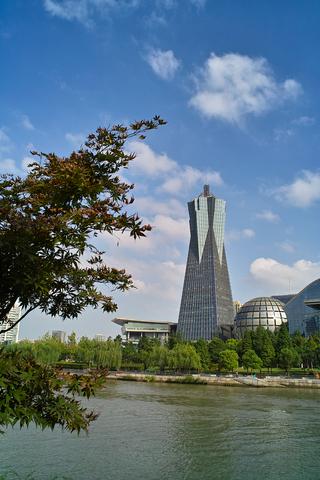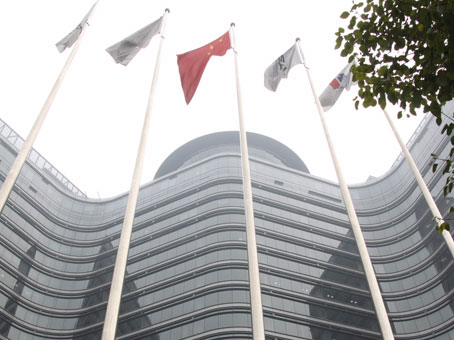
[Updated Oct 2020] A guide to serviced offices and office space to rent in Hangzhou as well as general information that may be useful if you are considering renting office space in the city.
For further Hangzhou office space information or to search office space to rent in Hangzhou just click. Or contact us for any office space search query.
History & Geography
The capital of Zhejian Province, Hangzhou is one of the largest cities in Eastern China and has a population verging on nine million people. The city lies on the Hangzhou Bay on the Yangtze River Delta, approximately 100 miles southwest of Shanghai. The city is on the southern loop of the Grand Canal of China and extends to the border of Anhui Province, a hilly area to the west. Hangzhou was founded during the Qin Dynasty and was one of the Seven Capitals of China. Eventually, the city became home to several large foreign communities. Among these was a large population of Arab merchants. During the Song Dynasty Hangzhou functioned as capital and became one of the most important centres of Chinese civilization, attracting poets, authors and wise men to the city. During the 13th century, the city had a population of almost two million, making it the largest in the world at that time. During this time the city was visited by the Venetian explorer Marco Polo who described it as ‘the finest and noblest in the world’. In the 16th and 17th centuries, Hangzhou was home to a sizable Jewish community and also continued to be a centre of Islam in China. During the mid-19th century, Hangzhou was occupied by the Taiping Heavenly Kingdom, a religious movement in revolt against the emperor. During this time the city was severely damaged and its population decimated. From the late 1920s until the middle of the 20th century the city was under the auspices of the Republic of China and it’s leader Dr Sun Yat-Sen. However, in 1949 the People’s Liberation Army marched into the city. Due to its advantageous position in the fertile and strategically important Yangtze River Valley, Hangzhou prospered and rapidly developed advanced infrastructure. It’s population grew quickly and today the city is one of the most prosperous in China.
Economy
Since it’s economy was opened to foreign investment and trade in 1992 it has prospered. Hangzhou has the largest GDP of any provincial capital bar Guangzhou. The average GDP is RMB 160 billion, more than three times what it was a decade ago. The Hangzhou Economic and Technological Development Zone covers 104 square kilometres and was designed to encourage the industries of biological medicine, food processing and machinery manufacturing. The High-Tech Industrial Development Zone, another fairly recent creation, was created as a kind of Chinese Silicon Valley and has received substantial foreign investment. The city itself has a diverse economy dominated by industry, agriculture, manufacturing and textiles. Furthermore, Hangzhou is a major logistics hub. In 2000 the Hangzhou Export Processing Zone was created to develop logistics and trade make the process of exporting easier and less bureaucratic. Many new industries have recently been developed in the city. These include telecommunications, fine chemicals, chemical fibre, food processing, information technology, medicine, heavy equipment, automotive parts and electrical components. Finally, Hangzhou has a thriving tourism industry. Every year thousands of visitors come to the city for its food, scenic parks and historical sites and artefacts.
Culture & Tourism
Hangzhou has an unrivalled reputation for beauty in China. Like almost all major Chinese cities, Hangzhou has undergone extensive urban development over the last few decades, yet has managed to retain its cultural sites and historic architecture. Hangzhou’s West Lake is among its most visited sites and is a UNESCO World Heritage Site. The lake is lined with ancient pagodas and temples, as well as willows and other trees. Among the most famous sites around the lake are Jingci Temple, Lingyin Temple, and Baochu Pagoda. Many also visit what is the world’s largest tidal bore on the Qiantang River. This occurs when the leading edge of an incoming tide forms an edge, or wave against the prevailing current. The Confucius Temple, Xixi National Wetland Park and Westlake Cultural Square are some of the other most visited sites in the city. Hangzhou is also known for its tea, specifically Longjing, a distinctive blend of green tea native to the city. Famous Hangzhou cuisine includes dishes such as braised bamboo shoots, Longjing Shrimp, Lotus Root Pudding and Lotus-wrapped Pork. Silk, distinctive Chinese fans, and umbrella are other prominent products of Hangzhou.
Transportation
Hangzhou is served by Hangzhou Xiaoshan International Airport which provides service to many major cities in Asia as well as Europe. The airport is currently being renovated and two new runways are to be added as well as a new airport express. Hangzhou is also an important railway hub with service revolving around the Hangzhou Railway Station which has service to Shanghai and several other important cities. The city itself is served by a fairly extensive public transportation network featuring buses, trolleys and taxis. Many residents of the city also use bicycles and electric scooters to get to work and home.

Office space to rent in Hangzhou
Hangzhou has one of the fastest-growing economies in China. It has a key role in the economy of the wider Yangtze River Delta region. Currently, the average office rental rate in the city is RMB 115 per square metre per month. The vacancy rate in Hangzhou is at 19 percent. This is mostly due to the abundance of projects which have come to fruition recently. Most of these are large office constructions on the outskirts of the city. One of the marquee projects soon to be delivered is the Raffles City project in the Qianjiang Xincheng district.
Our office space search, advisory and acquisition services are FREE, always. Our Hangzhou office space brokers and agents are globally regulated by the Royal Institution of Chartered Surveyors (RICS) ensuring the highest standards of commercial property advice and service at all times.

The Office Providers is Regulated by the RICS